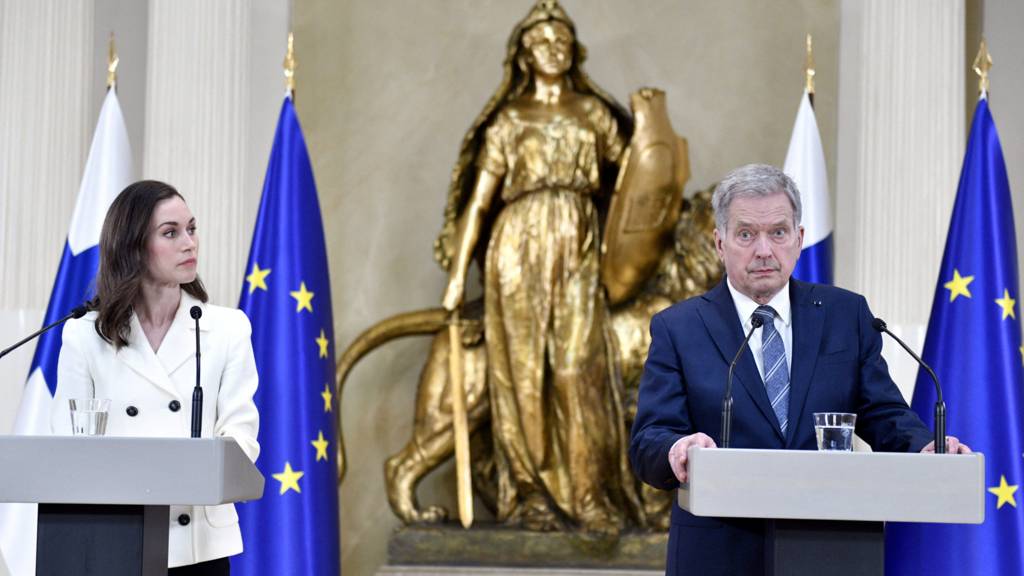
Sweden joining Finland in Nato membership bid
Updates from BBC correspondents: Sarah Rainsford and James Waterhouse in Kyiv, Laura Bicker in Donbas, Lyse Doucet and Hugo Bachega in Dnipro, Joe Inwood and Sophie Williams in Lviv, Caroline Davies in Odesa, and Steve Rosenberg in Moscow
Related Video and Audio
RTL
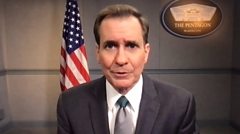
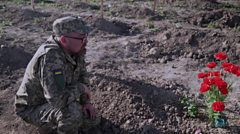
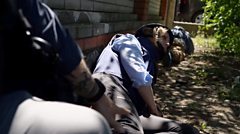



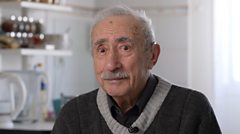
Live Reporting
Edited by Tom Spender
All times stated are UK
Get involved
-
Sweden's ruling party, the Social Democrats, says it backs the country joining Nato
-
Prime Minister Magdalena Andersson says she will go to parliament on Monday to secure support for an application
-
She said military non-alignment had served Sweden well in the past but was unlikely to do so in the future
-
Earlier Finland formally confirmed it wanted to join the military alliance
-
Finland's bid will also have to be discussed in parliament but the country's prime minister and president have spoken in favour of it
-
Turkey has expressed reservations, saying both countries harbour members of the Kurdistan Workers' Party (PKK), which it says is a terrorist group
-
However, Turkish Foreign Minister Mevlut Cavusoglu says Turkey is not threatening anybody or seeking leverage
-
On the battlefield, Russia's offensive in eastern Ukraine's Donbas region has lost momentum, according to an assessment from the UK military
-
Senior Ukrainian presidential adviser Mykhaylo Podolyak says Ukraine can defeat Russia by the end of the year but needs heavy weapons from the West and a "real oil embargo" on Russia
-
And Ukrainians have been enjoying the victory of their country's entry - folk-rap song Stefania by Kalush Orchestra - at the Eurovision Song Contest

EPACopyright: EPA -
Ms Andersson said Sweden needed the formal security guarantees that come with membership of Nato - her country would be more secure and also contribute to greater security
-
She said 200 years of military non-alignment had served Sweden well "but our conclusion is that it won't serve us as well in the future"
-
If Sweden were the only country in the Baltic region that was not in Nato, she said, it would be in a "very vulnerable position"
-
Joining the alliance was not "something against Russia" but something that was best for Sweden


BBCCopyright: BBC 
BBCCopyright: BBC 
Getty ImagesCopyright: Getty Images 
TT News Agency/ReutersCopyright: TT News Agency/Reuters 
.Copyright: . 
BBCCopyright: BBC 
Latest PostOur live coverage has resumed
Please join us here for the latest updates and analysis.
We're pausing our coverage
And that's all from us today.
We're pausing our live page for now but will resume our coverage of Russia's invasion of Ukraine here in the morning.
In the meantime you can read our news stories on Sweden and Finland's moves towards joining Nato here and the latest assessments of what's happening on the battlefield here.
Today's key developments
Here's a round-up of today's main events:
How Putin might respond
Putin's warnings to Finland and Sweden not to join Nato have gone unheeded. His invasion of Ukraine has triggered something he does not want: further enlargement of Nato right up to Russia’s borders. So how could he respond?
Military moves
For now, President Putin has his hands full in Ukraine so he is unlikely to make any sudden moves in Finland or Sweden’s direction. Russian troops close to the 800-mile(1300km) border with Finland have been redeployed south.
In time though, he is likely to move both troops and missiles nearer to Finland’s border and mount aggressive air and naval patrols
Hybrid warfare
Cyber-attacks and cyber-espionage have been going on for some time, aimed at most European states.
These can now be expected to be directed specifically at Finland and Sweden if they join Nato, accompanied by the usual official denials of culpability.
Subversion
Putin likes to play a long game and he may well decide that these two Nordic countries’ historic neutrality means any decision to join Nato can be reversed.
In time, he may opt to try to shape public opinion against Nato with the help of online bots and fake accounts.
PM Andersson on her party's reasoning
As we've been reporting, Sweden's ruling party has confirmed it is in favour of applying to join Nato.
The party's decision came a few hours after Finland also confirmed it was seeking to be part of the alliance.
Swedish Prime Minister Magdalena Andersson addressed reporters soon afterwards:
'If you come here, it will hurt': The Swedish island of Gotland
Paul Adams
BBC Diplomatic correspondent
If Sweden joins Nato, it'll represent a return to strategic significance for its largest island, Gotland.
Lying just 200 miles from Kaliningrad, headquarters of Russia’s Baltic fleet, the island had been likened to an unsinkable aircraft carrier. An ideal spot, during the Cold War, from which to defend Sweden and project power over the Baltic.
There was a time when as many as 20,000 troops were stationed there.
But Gotland's last military units stood down in 2005 and Gotland fell into military obscurity.
Russia's annexation of Crimea in 2014, and its subsequent sponsorship of separatist fighters in the Donbas led Sweden to reconsider.
On a visit to the island in 2016, I saw preparations for the return of a garrison.
Michael Bydén, Sweden's Supreme Commander, told me it was all about sending a message to Russia.
"If you come here, it will hurt."
But it was also about making sure that Sweden - which was already experiencing regular Russian military incursions into its airspace and submarine activity close to the capital Stockholm - was not taken by surprise.
The Gotland Regiment was reactivated in 2018.
Last month, the government announced plans to spend $163m boosting the island’s defences.
Back in 2016, a decision to join Nato was still some way off, but listening at the time to Swedish airforce communications – all in English – was just one of many signs that when the time came, "interoperability" with Nato forces would not be a problem.
What are Turkey's reservations over Nato bids?
Sweden and Finland are supported in their moves towards Nato membership by almost all Nato members - only Turkey has expressed reservations.
Ankara accuses both countries of having given support to the Kurdistan Workers Party (PKK), which has been waging an armed struggle against the Turkish government for decades.
Turkish Foreign Minister Mevlut Cavusoglu said Sweden and Finland must stop supporting terrorists in their countries, provide clear security guarantees and lift export bans on Turkey.
But he later added that Turkey was not threatening anybody or seeking leverage.
US Secretary of State Antony Blinken, Nato officials and Swedish and Finnish politicians all say they are confident any concerns can be addressed.
'Victory requires oil embargo, tanks, aircraft and artillery'
Ukraine needs heavy weapons from the West and a "real oil embargo" on Russia to defeat the latter by the end of the year, senior Ukrainian presidential adviser Mykhaylo Podolyak says.
"Ukraine is not interested in a protracted war with Russia, same as the whole world.
"We can't beat month this month [as published], but we can do it this year.
"The recipe for victory is simple: real oil embargo + tanks, aircraft and artillery. Let's end it together," he tweets in English.
Sweden stopped being neutral when it joined EU - former PM
Sweden stopped being neutral "when we entered the EU in 1995", the country’s former prime minister Carl Bildt has told the BBC.
The country has not been in a military conflict in over 200 years.
If both Sweden and Finland join Nato, Bildt said, it would be possible to "solidify and unify the defence and security arrangements for the entire northern European area".
Although formalising membership might take some time after application, both countries could formally join a Nato summit taking place in Madrid in June, he said.
"I think it's very important to have the support particularly from the US - that's key," he added.
US Secretary of State Antony Blinken said earlier that his country strongly supported both countries' bids for Nato membership.
Russia's invasion not going to plan - Nato chief
On the battlefield in Ukraine, Nato's secretary general says Russia's war is not going to plan.
Speaking at a meeting of Nato foreign ministers, Jens Stoltenberg said Russia was not achieving "its strategic objectives".
"They failed to take Kyiv, they are pulling back from around Kharkiv, their major offensive in Donbas has stalled," he added.
Mr Stoltenberg also said Ukraine could win the conflict.
His comments come as Britain's Ministry of Defence (MoD) estimates Russia has lost about a third of its ground combat force since the war began in February.
In its assessment, the MoD's estimate of Russia's losses cover men killed or wounded and equipment destroyed or captured.
Ukrainian forces were counterattacking in the city of Izyum, regional governor Oleh Sinegubov said, something that could complicate Russian plans to capture the Donbas.
However Ukraine's military also acknowledged setbacks in its latest updates, saying Russia was advancing in several areas in the region.
How popular is joining Nato in Sweden and Finland?
Sweden's decision to apply join Nato will end 200 years of military non-alignment.
In Finland, which today also confirmed it will put in a Nato bid, polls carried out by Finnish broadcaster Yle showed 76% of the population would support the country’s membership.
But in Sweden joining the alliance is a less popular stance. Recent polls suggest that about half of the population are in favour of joining the defensive military alliance.
Although this proportion is far higher than it was before Russia’s invasion of Ukraine, the country’s ruling party had previously been split on the issue.
Nato membership is not a move against Russia - Swedish PM
Swedish Prime Minister Magdalena Andersson says her country's decision to apply for Nato membership is "not something against Russia" but something that is best for Sweden.
She previously said the decision to join the alliance would help Sweden achieve more security and contribute to more security.
Andersson confirms her party hopes to synchronise Sweden's membership application with Finland's as much as possible.
Russian President Vladimir Putin previously described Finland's intention to join Nato as a mistake.
Turkey's concerns can be overcome - Swedish PM
Sweden's Prime Minister Magdalena Andersson says she will go to parliament tomorrow aiming to secure support for an application to join Nato.
She also says there's a good chance Turkey's reported doubts about Finland and Sweden's potential membership can be solved.
As we reported, on Saturday Turkey's Foreign Minister Mevlut Cavusoglu said it was "unacceptable and outrageous" that the prospective new members supported the outlawed Kurdish militant group PKK.
But on Sunday Nato's Deputy Secretary-General Mircea Geoana said he was confident the concerns could be addressed.
Announcing Finland's intention to join Nato earlier, the country's Prime Minister Sanna Marin said her nation's decision would also have to go through parliament but she trusted the Finnish parliament would debate "this historic decision with determination and responsibility", while President Sauli Niinisto said he was confused by reports of Turkish concerns.
What could Finland and Sweden bring to Nato?
Finland and Sweden both look like they are a step closer to joining Nato after their announcements today.
But what military capabilities will the two nations bring to the alliance?
Finland has many more troops at its disposal than its neighbour to the west but the vast majority of those are its huge number of reservists, which it could call up in the event of war.
In contrast Sweden has more than five times as many helicopters as Finland.
Sweden will be a security provider, says PM
Magdalena Andersson says as a member of Nato Sweden will "only achieve" more security and contribute to more security.
"Sweden will be a security provider," the Swedish prime minister adds.
But she says Sweden will be vulnerable during the application process - before it gets the full backing of other countries a Nato member would have.
'We would be in very vulnerable position' - Swedish PM
Magdalena Andersson has also just told reporters that if Sweden was the only country in the Baltic region that did not join Nato "we would be in a very vulnerable position".
As we've been reporting, Sweden has confirmed its intention to formally apply to join the alliance.
The announcement being made by the ruling Social Democrats comes a few hours after Finland announced it was seeking to be part of the alliance.
Sweden needs Nato security guarantees - Swedish PM
Sweden's Prime Minister Magdalena Andersson is currently speaking at a press conference.
She says Sweden needs the formal security guarantees that come with membership of Nato.
She is addressing reporters as Sweden has just announced it intends to apply to join the Nato alliance in the wake of Russia's invasion of Ukraine.
What's been happening today?
If you're just joining us, here's a round-up of what's been happening so far today.
Sweden's ruling party has just said it backs the country joining Nato. We're expecting to hear more about this in a news conference shortly.
The comes hours after Finland formally announced it wants to join the military alliance. Its bid needs to be discussed by its parliament – but the president and prime minister have both spoken in favour of joining.
Nato Secretary General Jens Stoltenberg says the two nations joining would be a historic moment.
The people of Ukraine have had some welcome positive news, with the country's resounding win at the Eurovision Song Contest. The victory was based largely on the votes of the international public, with President Volodymyr Zelensky saying it shows the world is impressed with Ukrainian courage.
And on the battlefield, Russia's offensive in the eastern Donbas region has lost momentum, according to an assessment from the UK military.
Monumental Nato decision by Sweden's ruling party
Maddy Savage
Reporting from Stockholm
The Social Democrats chose to announce their decision to back Nato membership with a low-key statement, half an hour before a scheduled news conference.
But their decision is monumental, paving the way for Sweden to move away from a position of military neutrality for the first time in two centuries.
For political analysts in Sweden the announcement isn’t surprising. Social Democrat ministers backed the findings of a cross-party report on Friday which concluded that membership would increase security in northern Europe and would be unlikely to trigger an armed attack from Russia.
Meanwhile public support for formally joining Nato has grown steadily since Russia invaded Ukraine. Most opposition parties are in favour, with just months to go until Sweden’s next general election.
Still there are some within the Social Democrats - and in the opposition Left and Green parties - who are anxious about joining. Not everyone’s convinced it makes military aggression from Russia less likely.
Others are already mourning the loss of a national identity as a neutral, peaceful nation that’s used to staying out of major global conflicts.
Sweden wants to join Nato but not have bases in the country
We've got more now on the decision of Sweden's ruling party to back the country joining Nato.
A statement says: "The Social Democrats' party board has decided that the party will work for Sweden to apply for membership in Nato."
But it does not want nuclear weapons or Nato bases in Sweden.
"The Social Democrats will thus work to ensure that Sweden, if the application is approved by Nato, expresses unilateral reservations against the deployment of nuclear weapons and permanent bases on Swedish territory," the statement continues.
Swedish leader Magdalena Andersson and other senior ministers from her party will speak in a news conference in about half an hour.